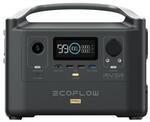The student discount code drops the price down by 15%.
The last of the stock for Generation 1 models. The new one retails at $1899.99, so it's a good deal considering the amount of power cuts there have been.
Features:
- Faster Recharging Speed. The RIVER Pro supports AC charge input up to 660W and can charge from 0-80% within 1 hour, achieving a full charge in 1.6 hours
- 2 AC Outlets. Step into the wild with complete peace of mind with the RIVER Pro. Whenever you are having a backyard adventure with the family or powering a completely off-grid adventure, the RIVER Pro powers essential appliances and devices
- Smart Solar Charging. The RIVER Pro can be charged with two 110W solar panels connected in parallel in 4.5 to 9 hours, which gives you the freedom to enjoy clean energy wherever you are
- Compact and Portable: Weighing just 7.6Kg, the RIVER Pro features an easy-to-carry handle, which makes it portable and easy to transport. It can easily fit in a car trunk, on a campsite, or indoors, giving you the power to take your adventure anywhere
Input/Output:
- AC Output (x2) : 600W Total, 230VAC (50Hz)
- USB-A Output (x2) : 5VDC, 2.4A, 12W Max Per Port
- USB-A Fast Charge (x1) : 5V, 9V, 12V, 2.4A 28W Max
- USB-C Output (x1) : 5VDC, 9VDC, 12VDC, 15VDC, 20VDC, 5A, 100W Max
- Car Power Output (x1) : 136W, 13.6VDC, 10A Max
- DC5521 Output (x2) : 13.6VDC, 3A Max Per Port
Input Ports:
- AC Charge Input Power : X-Stream Charge 660W Max
- AC Charge Input Voltage : 220-240VAC (50Hz/60Hz)
- Solar Charge Input : 200W 10-25VDC 12A Max
- Car Charger : 12VDC 8A Max
Charging:
- Charging Method : Ac Wall Outlet, 12V Car Adapter, Solar Panel(S)
- Full Recharge Time : 1.6 Hours (Ac) 8 Hours (12V Car Adapter) 4-8 Hours (Using 2x 110W Solar Panels In Parallel With Direct Sunlight) 6-12 Hours (Using 1x 160W Solar Panel With Direct Sunlight)
Battery Info:
- Capacity : 720Wh (28.8V)
- Cell Chemistry : Lithium-Ion
- Cycle Life : 800 Cycles To 80%+ Capacity
- Management Systems : BMS, Over Voltage Protection, Overload Protection, Over Temperature Protection, Short Circuit Protection Low Temperature Protection, Low Voltage Protection, Overcurrent Protection
- Testing and Certifications : UL Standard, CE, FCC, RoHS, RCM
Specifications:
- Net Weight : 7.6 kg
- Dimensions : 28.9 X 18.0 X 23.5 cm
- Charge Temperature : 0 To 45°C +/- 3°C
- Discharge Temperature : -20 To 45°C +/- 3°C
- Colour : Black


Where’s the code OP